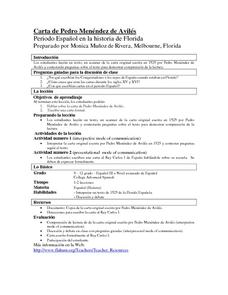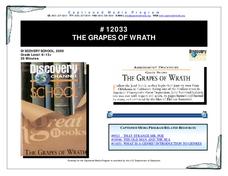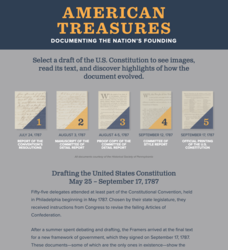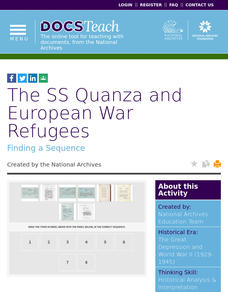Alabama Department of Archives and History
Alabama's New South Era
The industrialization and urbanization of Alabama during the New South era (1865-1914) is the focus of a lesson that asks class members to use primary source documents to examine the impact of industrialization on Alabama workers and...
Curated OER
Carta de Pedro Menéndez de Avilés
Spanish learners peek back into history by reading a copy of an original letter written in the sixteenth century by Pedro Menéndez de Avilés. To show their comprehension, they respond to a series of provided questions. For writing...
Huntington Library
Everyday Life - Exploring the California Missions
Young scholars relive history as they examine primary sources that document everyday life in the California missions. During a class viewing of the included slideshow presentation, children analyze documents, paintings, and drawings in...
Huntington Library
Religion & Spirituality - Exploring the California Missions
The California missions were built with the hope of converting the local Native Americans to Catholicism, but exactly how different were their beliefs to begin with? Through analysis of a series of primary source documents, young...
Carnegie Library
Creative Writing: Middle School Lesson Plan
Enhance a unit on historical fiction with an engaging writing lesson. Learners bring the Industrial Era to life as they compose their own historical fiction pieces based on primary source images of Pittsburgh steel workers.
Museum of Tolerance
Documents That Shape Society
The Bill of Rights is a foundational document of American democracy, much like the Nuremberg Laws were a foundational document of the Reichstag of Nazi Germany. But that's where their similarities end. Engage high schoolers in a...
Captioned Media
Creating Dramatic Monologues from The Grapes of Wrath
Set in Oklahoma in the 1930s, The Grapes of Wrath presents a powerful view of life during the Great Depression. An insightful lesson plan takes a closer look at the characters in John Steinbeck's classic novel, combining the descriptions...
Carolina K-12
African American Troops in the Civil War
Middle schoolers explore the history of the African-American troops that served during the American Civil War. After reading primary source documents that detail the controversies about permitting freemen and former slaves to serve,...
National Constitution Center
American Treasures
Just how long did it take the framers to write the Constitution? What role did the drafting process play? Scholars examine various drafts from the Constitutional Convention to gain a better understanding of its formation. Interactive...
American Battle Monuments Commission
Honoring Service, Achievements, and Sacrifice: A WWI Virtual Field Trip
The largest offensive in United States military history comes alive in a online interactive resource. Young historians explore the Meuse Argonne battlefield and scour the landscape for evidence from the battle. They then use primary...
National WWII Museum
Rationing by the Numbers: Quantitative Data as Evidence
What was it like to live on wartime rations in the United States during World War II? Young historians find out by exploring how those on the home front bought food thanks to the ration system. Other data includes statistics on car sales...
EngageNY
Building Background Knowledge: The Internment of Japanese-Americans during WWII, Part 4
Learners use a Analyzing Mediums handout to detail the advantages and disadvantages of communicating with mediums such as artwork, photographs, and political cartoons in the Japanese-American Internment during World War II primary...
Curated OER
The Home Front
Young historians explore life on the home front during the Civil War with primary documents and a series of writing prompts. They also watch a presentation and use a worksheet to compare how communication methods have changed over time....
Curated OER
Post-1865: Effects of the War
An engaging lesson plan focuses on the impact of the war and Lincoln's plan for Reconstruction had on the United States. Historians analyze primary documents, such as Constitutional Amendments and newspaper experts. They also participate...
Facing History and Ourselves
The World the War Made
The United States Civil War forced Northern and Southern societies, as well as the people who made up those societies, to reconstruct their vision of themselves and their identities. A series of video-based web lessons look at the great...
National Woman's History Museum
Congresswoman Jeannette Rankin
Political activist, suffragette, pacifist, and the first woman elected to Congress, Jeannette Rankin has been largely ignored in history and history textbooks. Young historians set out to rectify that situation by examining primary...
DocsTeach
Comparing American and French Revolutionary Documents
This document or that? Historians compare crucial documents from both the American and French Revolution to gain a better understanding of the purpose and impact the documents had on each nation. Academics read excerpts from both...
DocsTeach
Analyzing a Petition about Slavery
Practice analyzing primary sources in a thought-provoking lesson on the impact of slavery. Young historians read a petition regarding the Fugitive Slave Law and answer a series of questions to understand the importance of the document....
DocsTeach
Analyzing a Letter from Jackie Robinson: "Fair Play and Justice"
Jackie Robinson was more than a baseball legend; he was an activist, too. An interesting resource explores Robinson's time in the military using primary sources. Scholars examine the racially inspired event that led to a court martial...
DocsTeach
Confronting Work Place Discrimination on the World War II Home Front
Before the Civil Rights Movement was in full swing, FDR's executive order helped promote fair employment. The activity uses primary documents to explore FDR's executive order to help minorities gain equal employment and pay during the...
DocsTeach
Pearl Harbor Dispatch Analysis
Scholars play a historical version of the telephone game when they analyze the dispatch from the Pearl Harbor attack. The quick activity uses primary sources to help academics analyze an historical event. Young historians also complete a...
DocsTeach
The SS Quanza and European War Refugees
World War II not only resulted in major loss of life, but it also displaced thousands of people. An eye-opening activity uses primary documents to explore the refugee crisis during World War II. Scholars compare the event to modern-day...
Smithsonian Institution
Re-Segregation of American Schools: Re-Segregation
Examine the re-segregation of public schools in a thought-provoking resource. Young scholars read articles and primary sources, complete worksheets, and watch a video to explore the idea that desegregation made schools more segregated....
Center for History Education
Maryland During the Secession Crisis
While many think the United States was neatly divided between Northern and Southern states during the Civil War, border states like Maryland are more complicated. Using hands-on activities to measure distance and primary sources,...
Other popular searches
- Using Primary Sources
- Wwi, Primary Sources
- Rosa Parks Primary Documents
- Gilded Age Primary Sources
- Working With Primary Sources
- Primary Resources Hsie
- Web Quests Primary Sources
- Ancient Rome Primary Sources
- 1920 1929 Primary Sources
- Primary Sources and Family
- Conscription Primary Sources
- Scotland Primary Sources

























